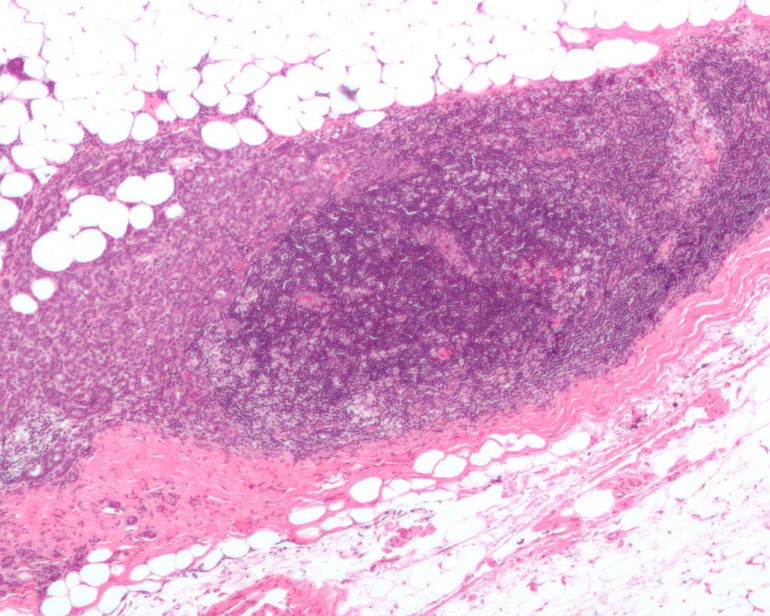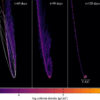Researchers at the Technion—Israel Institute of Technology have developed an innovative treatment for breast cancer, based on analgesic nanoparticles that target the nervous system. The study, published in Science Advances, was led by Professor Avi Schroeder and Ph.D. student Maya Kaduri of the Wolfson Faculty of Chemical Engineering.
Breast cancer is one of the most common cancers in women, and despite breakthroughs in diagnosis and treatment, about one thousand women in Israel die of the disease per year. Around 15% of them are under the age of 50. Worldwide, some 685,000 women die each year from breast cancer.
Prof. Schroeder has years of experience in developing innovative cancer treatments, including ones for breast cancer and specifically triple-negative breast cancer—an aggressive cancer characterized by rapid cell division with a higher risk of metastasis. Technologies developed in his lab include novel methods for encapsulating drug molecules in nanoparticles that transport the drug to the tumor and release it inside, without damaging healthy tissue.
The researchers found that cancer cells have a reciprocal relationship with the nerve cells around them: the cancer cells stimulate infiltration of nerve cells into the tumor, and this infiltration stimulates cancer cell proliferation, growth, and migration. In other words, the cancer cells recruit the nerve cells for their purposes.
Based on these findings, the researchers developed a treatment that targets the tumor through the nerve cells. This treatment is based on injecting nanoparticles containing anesthetic into the bloodstream. The nanoparticles travel through the bloodstream toward the tumor, accumulate around the nerve cells in the cancerous tissue, and paralyze the local nerves and communication between the nerve cells and the cancer cells. The result: Significant inhibition of tumor development and of metastasis to the lungs, brain, and bone marrow.
The nanoparticles simulate the cell membrane and are coated with special polymers that disguise them from the immune system and enable a long circulation time in the bloodstream. Each such particle, which is around 100 nm in diameter, contains the anesthetic.
According to Maya Kaduri, “We know how to create the exact size of particles needed, and that is critical because it’s the key to penetrating the tumor. Tumors stimulate increased formation of new blood vessels around them, so that they receive oxygen and nutrients, but the structure of these blood vessels is damaged and contains nano-sized holes that enable penetration of nanoparticles. The cancerous tissue is characterized by poor lymphatic drainage, which further increases accumulation of the particles in the tissue.
“Therefore, the anesthetizing particles we developed move through the bloodstream without penetrating healthy tissue. Only when they reach the damaged blood vessels of the tumor do they leak out, accumulate around the nerve cells of the cancerous tissue, and disconnect them from the cancer cells. The fact that this is a very focused and precise treatment enables us to insert significant amounts of anesthetic into the body because there is no fear that it will harm healthy and vital areas of the nervous system.”
In experiments on cancer cell cultures and in treatment of mice, the new technology inhibited not only tumor development but also metastasis. The researchers estimate these findings may be relevant for treatment of breast cancer in humans.
Prof. Avi Schroeder is head of the Louis Family Laboratory for Targeted Drug Delivery & Personalized Medicine Technologies at the Wolfson Faculty of Chemical Engineering. Maya Kaduri, who has a B.Sc. from the Faculty of Biotechnology and Food Engineering at the Technion, began researching under the guidance of Prof. Avi Schroeder during her bachelor’s degree, and this year she is expected to complete her Ph.D. (direct track).
Breast cancer stem cells may use an arteriolar niche to prepare for metastasis
More information:
Maya Kaduri et al, Targeting neurons in the tumor microenvironment with bupivacaine nanoparticles reduces breast cancer progression and metastases, Science Advances (2021). DOI: 10.1126/sciadv.abj5435. www.science.org/doi/10.1126/sciadv.abj5435
Provided by
Technion – Israel Institute of Technology
Citation:
Cancer cells mobilizing the nervous system? Let’s use them to inhibit the tumor (2021, October 18)
retrieved 18 October 2021
from https://medicalxpress.com/news/2021-10-cancer-cells-mobilizing-nervous-inhibit.html
This document is subject to copyright. Apart from any fair dealing for the purpose of private study or research, no
part may be reproduced without the written permission. The content is provided for information purposes only.



